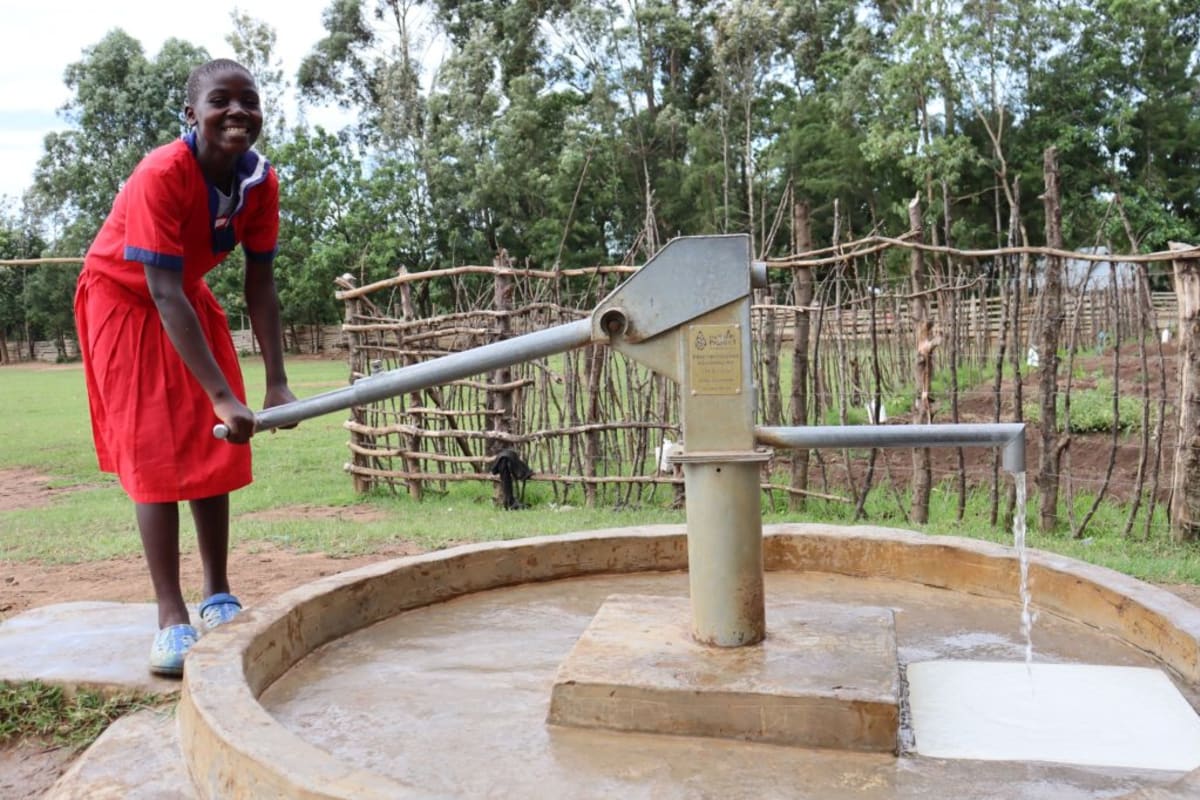Miriam Mwalati, Head Teacher at St. Mary's Fubuye Primary School, told us that she has been praying for help with the water situation at her school. "Water is a challenge, as you have seen," she said, "and water is never enough. Kindly help us meet this demand."
And there is a lot of demand.
There are 1,026 students at St. Mary's Fubuye and 23 staff members, all fetching water from the same hand-dug well. The well regularly dries up, leaving everyone to get water from wherever they can find it.

When the well does have water, its quality and safety are in question. Most people who drink the school's water end up with at least a stomachache, though cases of cholera have also been reported. The water is visibly dirty; after two or three buckets have been drawn, the next person has to wait for the dirt to settle again before they can fetch any clear water.
"We waste time here collecting water for cleaning and kitchen use," said Fredrick P., a 13-year-old student at the school (pictured fetching water, below). "We fear drawing water from this well because of accidents."

Some of the school's smaller and younger students aren't allowed to fetch water because they might fall in the well's hazardous opening. They must ask older students to help them or go without water.
It's easy to see why Head Teacher Miriam has been praying for assistance.
What We Can Do:
New Well
We conducted a hydrogeological survey at this school and the results indicated the water table beneath it is an ideal candidate for a borehole well. Due to a borehole well's unique ability to tap into a safe, year-round water column, it will be poised to serve all of the water needs for this school's large population, even through the dry months.
The school will help collect the needed construction materials such as sand, rocks, and water for mixing cement. They will also provide housing and meals for the work team, in addition to providing local laborers. We will complement their materials by providing an expert team of artisans and drilling professionals, tools, hardware, and the hand-pump. Once finished, water from the well will then be used by the school’s students and staff for drinking, handwashing, cooking, cleaning, and much more.
Handwashing Stations
There is currently nowhere for students to wash their hands after using the latrines or before eating lunch, let alone the water to do so.
The student health club will oversee the two new handwashing stations we will provide, and make sure they are kept clean and in working condition. The club leaders will fill the handwashing stations with water daily and make sure they are always supplied with a cleaning agent such as soap or ash.
VIP Latrines
We will construct two triple-door latrine blocks using local materials that the school will help gather. Three doors will serve the girls and three doors will serve the boys. All of these new latrines will have cement floors that are designed to be easy to use and to clean. And with a borehole right on school property, there should be enough water to keep them clean.
Training on Health, Hygiene, COVID-19, and More
We will hold a one-day intensive training session with students, teachers, and parents. This training will cover a wide range of topics including COVID-19 symptoms, transmission routes, and prevention; personal and environmental hygiene; and the operation and maintenance of the borehole, latrines, and handwashing stations. There will be a special emphasis on handwashing.
Our team of facilitators will use a variety of methods to train, including participatory hygiene and sanitation transformation, and asset-based community development. We will initiate a student health club, which will prepare students to lead other pupils into healthy habits at school and at home. We will also lead lectures, group discussions, and provide illustrative handouts to teach health topics and ways to promote good hygiene practices within the school including handwashing and water treatment. We will then conduct a series of follow-up trainings before transitioning to our regularly scheduled support visits throughout the year.
We and the school strongly believe that all of these components will work together to improve standards at this school, which will help lead to better student academic performance and will help unlock the opportunity for these students to live better, healthier lives.

 Borehole Well and Hand Pump
Borehole Well and Hand Pump
 Rehabilitation Project
Rehabilitation Project



































